Introduction
In today's world, access to reliable and consistent power supply is essential for various activities, ranging from everyday tasks to critical operations in remote areas. However, many off-grid locations face challenges in meeting their energy needs due to the lack of infrastructure or unreliable grid connections. In such scenarios, diesel generators emerge as a versatile and efficient solution for providing power supply in remote areas. This article explores the role of diesel generators in remote power supply, highlighting their benefits, applications, and considerations for optimal performance.
Understanding Diesel Generators
Diesel generators are a type of power generation equipment that utilizes a diesel engine to convert diesel fuel into mechanical energy, which is then converted into electrical power through an alternator. These generators are widely used in various applications, including standby power backup, prime power supply, and emergency power generation. Diesel generators come in a range of sizes, from portable units suitable for small-scale applications to large industrial generators capable of powering entire facilities.
Benefits of Diesel Generators for Remote Power Supply
1. Reliability: One of the key advantages of diesel generators is their reliability. Diesel engines are known for their robust construction and durability, making them well-suited for continuous operation in remote locations with limited access to maintenance services. This reliability ensures a consistent power supply, even in challenging environmental conditions.
2. Fuel Efficiency: Diesel generators are more fuel-efficient compared to gasoline generators, providing higher energy output for the same amount of fuel consumed. This fuel efficiency is advantageous in remote areas where fuel availability may be limited, allowing for longer operating times between refueling.
3. Power Output and Scalability: Diesel generators offer high power output capabilities, making them suitable for powering a wide range of equipment and appliances in remote locations. Additionally, these generators can be easily scaled up or down to meet varying power demands, providing flexibility in adapting to changing energy requirements.
4. Longevity: Diesel generators have a longer lifespan compared to other types of generators, thanks to the robust design of diesel engines and their lower operating temperatures. This longevity translates to lower maintenance costs and greater overall value for remote power supply applications.
Applications of Diesel Generators in Remote Areas
1. Mining and Exploration Sites: Remote mining and exploration sites often require reliable power supply to operate heavy machinery, lighting systems, and other equipment essential for mining operations. Diesel generators are commonly used in these settings to provide the necessary power for continuous operation.
2. Telecommunications Infrastructure: Remote communication towers and equipment require a stable power supply to ensure uninterrupted connectivity. Diesel generators serve as a dependable source of backup power for telecommunication infrastructure in remote areas, helping maintain communication networks during power outages.
3. Off-Grid Communities: Many off-grid communities lack access to centralized power grids, relying instead on alternative energy sources such as diesel generators for their electricity needs. These generators play a crucial role in powering homes, schools, healthcare facilities, and other essential services in remote communities.
4. Remote Construction Sites: Construction projects in remote areas often require temporary power supply for tools, equipment, and lighting. Diesel generators are commonly used on construction sites to provide on-demand power, enabling construction activities to proceed smoothly in off-grid locations.
Considerations for Optimal Performance of Diesel Generators
1. Regular Maintenance: Proper maintenance is essential for ensuring the reliable performance of diesel generators in remote locations. Regular inspections, servicing, and component replacements should be conducted according to the manufacturer's recommendations to prevent breakdowns and extend the lifespan of the generator.
2. Fuel Quality and Storage: Diesel generators are sensitive to fuel quality, and using contaminated or degraded fuel can lead to engine problems and reduced efficiency. It is important to use high-quality diesel fuel and store it properly to prevent contamination and degradation over time.
3. Environmental Considerations: Diesel generators produce emissions that can have environmental impacts, including air pollution and carbon emissions. In remote areas with sensitive ecosystems, it is important to consider the environmental implications of diesel generator use and explore alternative energy sources where feasible.
4. Remote Monitoring and Control: Remote monitoring systems can be installed to track the performance and status of diesel generators in real-time, allowing for proactive maintenance and troubleshooting. Going Here enable remote operators to monitor fuel levels, engine parameters, and power output, enhancing the reliability and efficiency of the generator.

Conclusion
Diesel generators play a vital role in providing reliable power supply in remote areas where access to electricity is limited or unreliable. Their robust construction, fuel efficiency, and scalability make them well-suited for a wide range of applications, from mining sites to off-grid communities. By considering factors such as maintenance, fuel quality, environmental impacts, and remote monitoring, operators can ensure the optimal performance of diesel generators in remote power supply applications. As technology advances and alternative energy sources become more accessible, diesel generators continue to be a dependable solution for meeting the energy needs of remote locations around the world.
